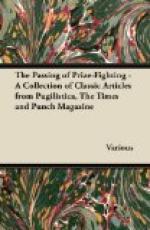It is well known that the sacred fire of fashion burns—or is supposed to burn—in Belgravia alone. Its warmth drew her irresistibly. Bayswater became too cold to hold her, and early in the following year it was announced that a large house in the purlieus of Grosvenor Square had been purchased by her husband. However, she was content to climb by degrees, and, in her first season of social brilliancy, she restricted herself to a small and early dance, and a musical evening. At the dance, universal admiration was excited by the lavish profusion of the flowers with which her staircase was adorned, by the excellent quality of the champagne, and the inexhaustible supply of oysters. At the musical evening the music was as admirably rendered as it was completely neglected. And at both parties only those people were present as to whose social status and absolute “rightness” there could be no question. Indeed the dancer, whose foot had been trodden upon at the former, might console herself with the thought that none but a noble boot had caused her pain; while at the latter the sounds of heavy breathing, which mingled inharmoniously with Mlle. FALSETTI’s bravura, were forgiven, in consideration of the exalted rank of their producer. Her success seemed now to be assured, and even the muttered discontent of a neglected husband, who was foolish enough to prefer comfort to smartness, began to subside. In the following year her entertainments became even more splendid, and less comfortable. She took a house at Ascot, and, triumph of triumphs! a scion of Royalty deigned to accept her hospitality.




